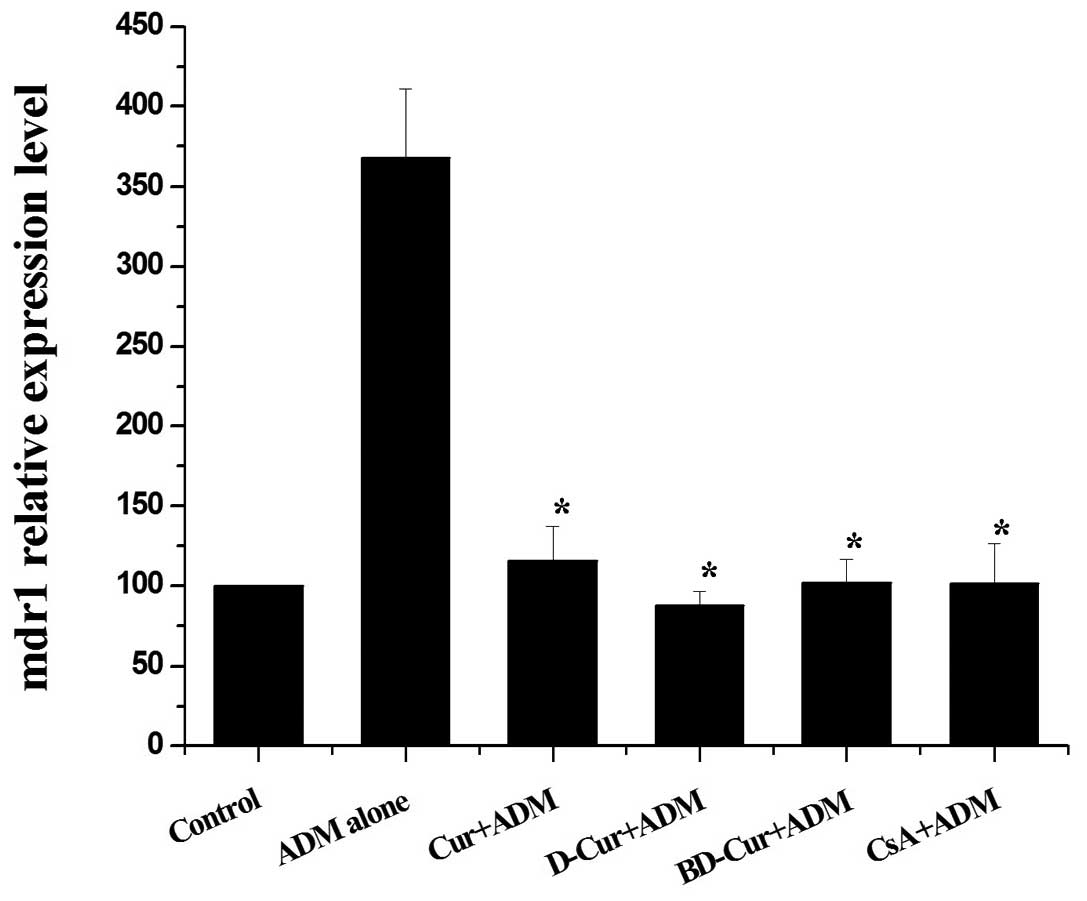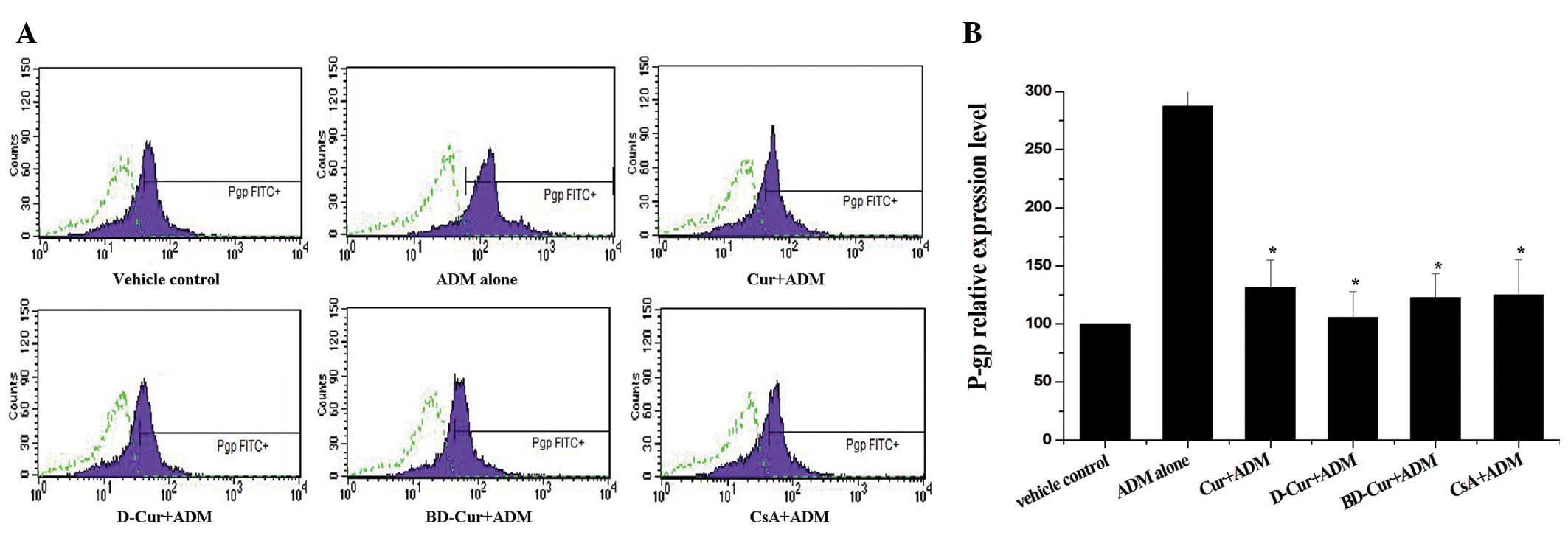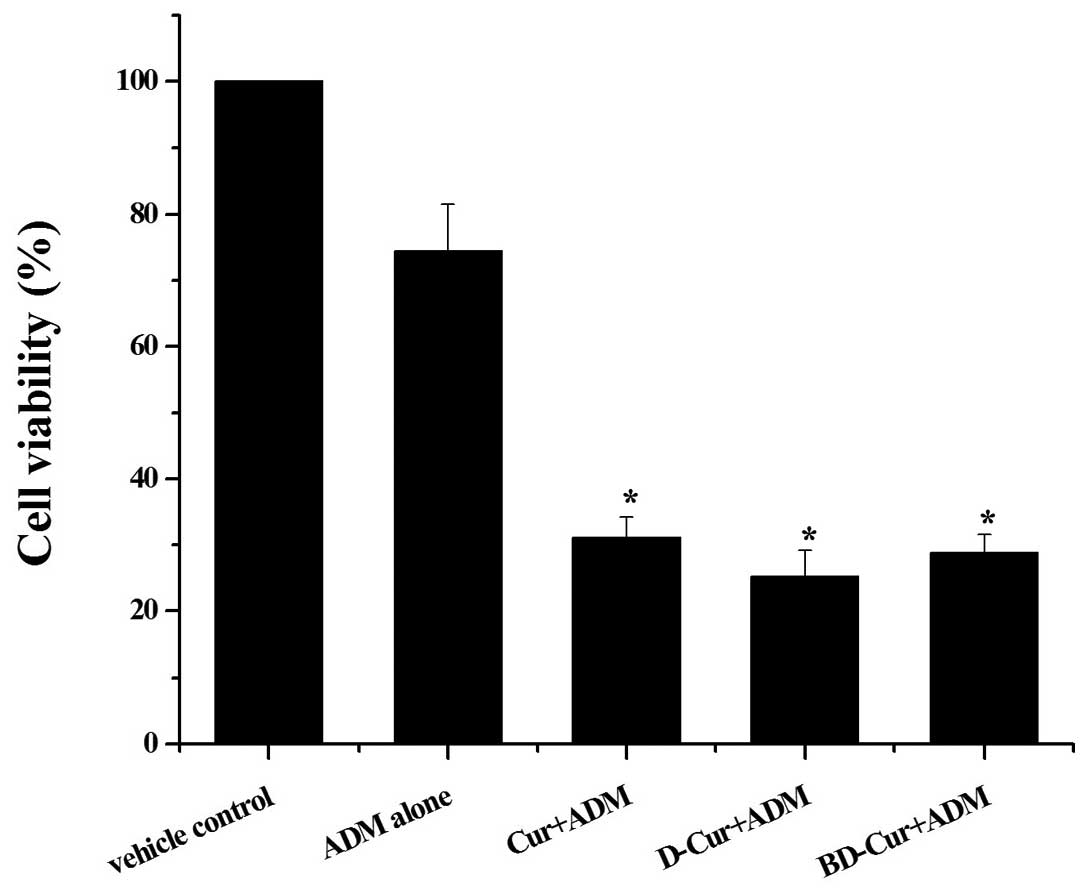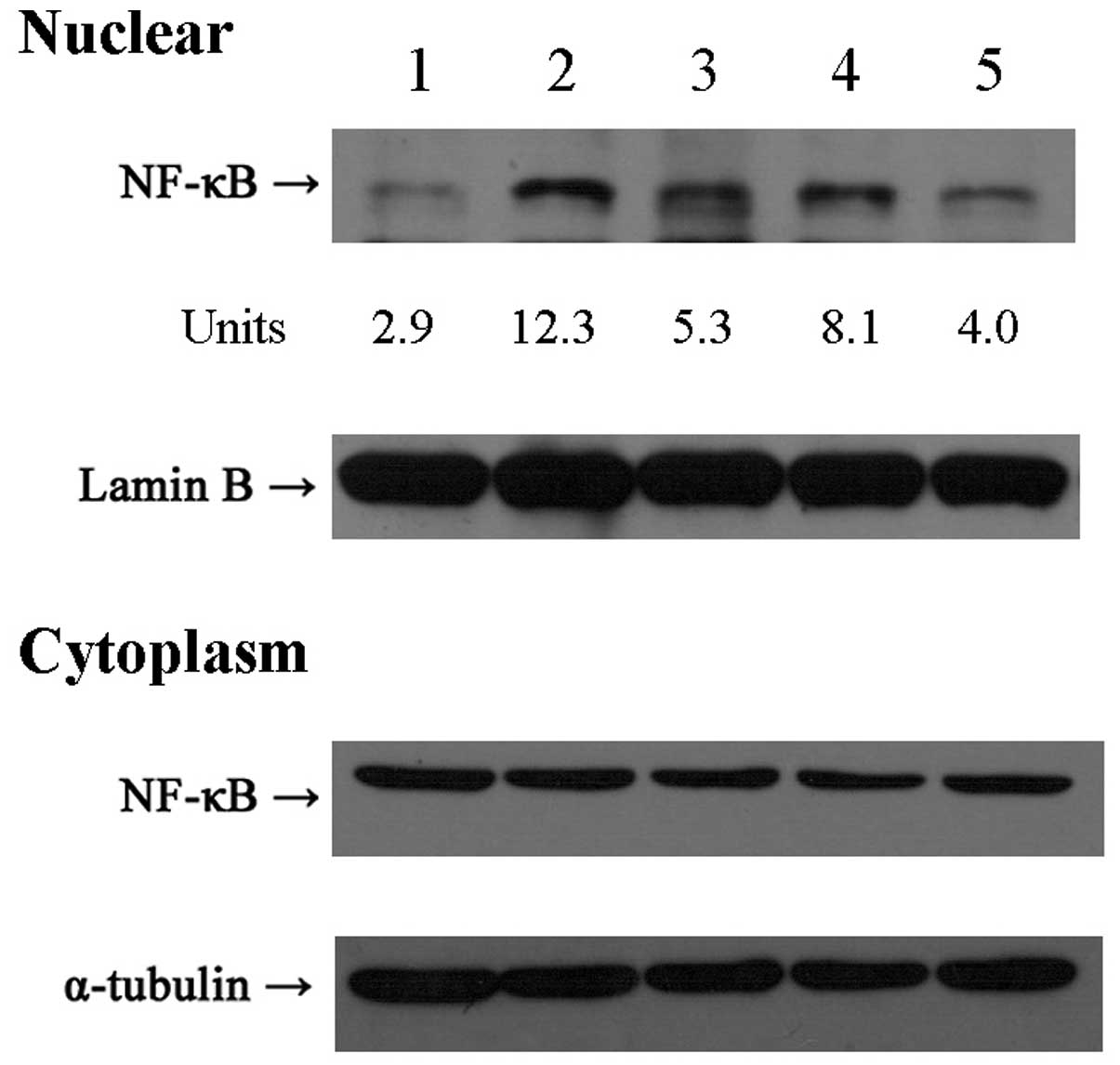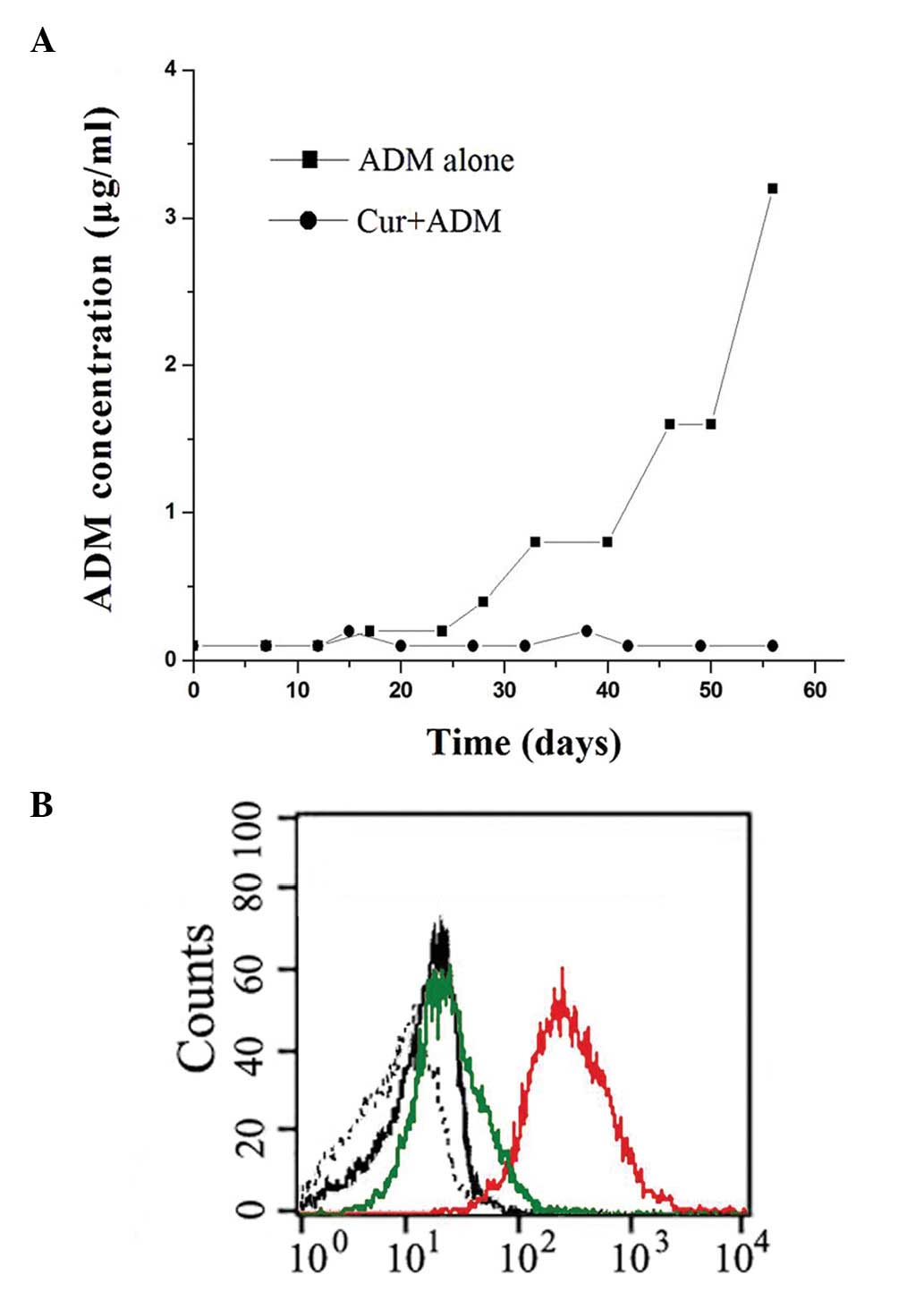|
1
|
Cole SP, Bhardwaj G, Gerlach JH, et al:
Overexpression of a transporter gene in a multidrug-resistant human
lung cancer cell line. Science. 258:1650–1654. 1992. View Article : Google Scholar : PubMed/NCBI
|
|
2
|
Gottesman MM, Fojo T and Bates SE:
Multidrug resistance in cancer: role of ATP-dependent transporters.
Nat Rev Cancer. 2:48–58. 2002. View
Article : Google Scholar : PubMed/NCBI
|
|
3
|
Schinkel AH and Jonker JW: Mammalian drug
efflux transporters of the ATP binding cassette (ABC) family: an
overview. Adv Drug Deliv Rev. 55:3–29. 2003. View Article : Google Scholar : PubMed/NCBI
|
|
4
|
Xu D, Lu Q and Hu X: Down-regulation of
P-glycoprotein expression in MDR breast cancer cell MCF-7/ADR by
honokiol. Cancer Lett. 243:274–280. 2006. View Article : Google Scholar : PubMed/NCBI
|
|
5
|
Pan Q, Lu Q, Zhang K and Hu X:
Dibenzocyclooctadiene lingnans: a class of novel inhibitors of
P-glycoprotein. Cancer Chemother Pharmacol. 58:99–106. 2006.
View Article : Google Scholar : PubMed/NCBI
|
|
6
|
Sun M, Xu X, Lu Q, Pan Q and Hu X:
Schisandrin B: a dual inhibitor of P-glycoprotein and multidrug
resistance-associated protein 1. Cancer Lett. 246:300–307. 2007.
View Article : Google Scholar : PubMed/NCBI
|
|
7
|
Sakaeda T, Nakamura T, Hirai M, et al:
MDR1 up-regulated by apoptotic stimuli suppresses apoptotic
signaling. Pharm Res. 19:1323–1329. 2002. View Article : Google Scholar : PubMed/NCBI
|
|
8
|
Gottesman MM and Ling V: The molecular
basis of multidrug resistance in cancer: the early years of
P-glycoprotein research. FEBS Lett. 580:998–1009. 2006.PubMed/NCBI
|
|
9
|
Xu DTW and Shen H: Curcumin prevents
induced drug resistance: a novel function? Chin J Cancer Res.
23:218–223. 2011. View Article : Google Scholar : PubMed/NCBI
|
|
10
|
Schiedlmeier B, Kuhlcke K, Eckert HG, Baum
C, Zeller WJ and Fruehauf S: Quantitative assessment of retroviral
transfer of the human multidrug resistance 1 gene to human
mobilized peripheral blood progenitor cells engrafted in nonobese
diabetic/severe combined immunodeficient mice. Blood. 95:1237–1248.
2000.
|
|
11
|
Cocker HA, Tiffin N, Pritchard-Jones K,
Pinkerton CR and Kelland LR: In vitro prevention of the emergence
of multidrug resistance in a pediatric rhabdomyosarcoma cell line.
Clin Cancer Res. 7:3193–3198. 2001.PubMed/NCBI
|
|
12
|
Shen H, Xu W, Chen Q, Wu Z, Tang H and
Wang F: Tetrandrine prevents acquired drug resistance of K562 cells
through inhibition of mdr1 gene transcription. J Cancer Res Clin
Oncol. 136:659–665. 2010. View Article : Google Scholar : PubMed/NCBI
|
|
13
|
Yague E, Armesilla AL, Harrison G, et al:
P-glycoprotein (MDR1) expression in leukemic cells is regulated at
two distinct steps, mRNA stabilization and translational
initiation. J Biol Chem. 278:10344–10352. 2003. View Article : Google Scholar : PubMed/NCBI
|
|
14
|
Hu XF, Slater A, Wall DM, Parkin JD,
Kantharidis P and Zalcberg JR: Cyclosporin A and PSC 833 prevent
up-regulation of MDR1 expression by anthracyclines in a human
multidrug-resistant cell line. Clin Cancer Res. 2:713–720.
1996.PubMed/NCBI
|
|
15
|
Su CC, Lin JG, Li TM, et al:
Curcumin-induced apoptosis of human colon cancer colo 205 cells
through the production of ROS, Ca2+ and the activation
of caspase-3. Anticancer Res. 26:4379–4389. 2006.PubMed/NCBI
|
|
16
|
Lin YG, Kunnumakkara AB, Nair A, et al:
Curcumin inhibits tumor growth and angiogenesis in ovarian
carcinoma by targeting the nuclear factor-kappaB pathway. Clin
Cancer Res. 13:3423–3430. 2007. View Article : Google Scholar : PubMed/NCBI
|
|
17
|
Yodkeeree S, Chaiwangyen W, Garbisa S and
Limtrakul P: Curcumin, demethoxycurcumin and bisdemethoxycurcumin
differentially inhibit cancer cell invasion through the
down-regulation of MMPs and uPA. J Nutr Biochem. 20:87–95. 2009.
View Article : Google Scholar : PubMed/NCBI
|
|
18
|
Tamvakopoulos C, Dimas K, Sofianos ZD, et
al: Metabolism and anticancer activity of the curcumin analogue,
dimethoxycurcumin. Clin Cancer Res. 13:1269–1277. 2007. View Article : Google Scholar : PubMed/NCBI
|
|
19
|
Anuchapreeda S, Leechanachai P, Smith MM,
Ambudkar SV and Limtrakul PN: Modulation of P-glycoprotein
expression and function by curcumin in multidrug-resistant human KB
cells. Biochem Pharmacol. 64:573–582. 2002. View Article : Google Scholar : PubMed/NCBI
|
|
20
|
Limtrakul P, Anuchapreeda S and Buddhasukh
D: Modulation of human multidrug-resistance MDR-1 gene by natural
curcuminoids. BMC Cancer. 4:132004. View Article : Google Scholar : PubMed/NCBI
|
|
21
|
Chearwae W, Wu CP, Chu HY, Lee TR,
Ambudkar SV and Limtrakul P: Curcuminoids purified from turmeric
powder modulate the function of human multidrug resistance protein
1 (ABCC1). Cancer Chemother Pharmacol. 57:376–388. 2006. View Article : Google Scholar : PubMed/NCBI
|
|
22
|
Li Y, Revalde JL, Reid G and Paxton JW:
Modulatory effects of curcumin on multi-drug resistance-associated
protein 5 in pancreatic cancer cells. Cancer Chemother Pharmacol.
68:603–610. 2011. View Article : Google Scholar : PubMed/NCBI
|
|
23
|
Egashira M, Kawamata N, Sugimoto K, Kaneko
T and Oshimi K: P-glycoprotein expression on normal and abnormally
expanded natural killer cells and inhibition of P-glycoprotein
function by cyclosporin A and its analogue, PSC833. Blood.
93:599–606. 1999.PubMed/NCBI
|
|
24
|
Su CC, Chen GW, Lin JG, Wu LT and Chung
JG: Curcumin inhibits cell migration of human colon cancer colo 205
cells through the inhibition of nuclear factor kappa B/p65 and
down-regulates cyclooxygenase-2 and matrix metalloproteinase-2
expressions. Anticancer Res. 26:1281–1288. 2006.
|
|
25
|
Amiri KI and Richmond A: Role of nuclear
factor-kappa B in melanoma. Cancer Metastasis Rev. 24:301–313.
2005. View Article : Google Scholar : PubMed/NCBI
|
|
26
|
Kunnumakkara AB, Guha S, Krishnan S,
Diagaradjane P, Gelovani J and Aggarwal BB: Curcumin potentiates
antitumor activity of gemcitabine in an orthotopic model of
pancreatic cancer through suppression of proliferation,
angiogenesis, and inhibition of nuclear factor-kappaB-regulated
gene products. Cancer Res. 67:3853–3861. 2007. View Article : Google Scholar
|
|
27
|
Ahsan H, Parveen N, Khan NU and Hadi SM:
Pro-oxidant, anti-oxidant and cleavage activities on DNA of
curcumin and its derivatives demethoxycurcumin and
bisdemethoxycurcumin. Chem Biol Interact. 121:161–175. 1999.
View Article : Google Scholar : PubMed/NCBI
|
|
28
|
Sandur SK, Pandey MK, Sung B, et al:
Curcumin, demethoxycurcumin, bisdemethoxycurcumin,
tetrahydrocurcumin and turmerones differentially regulate
anti-inflammatory and anti-proliferative responses through a
ROS-independent mechanism. Carcinogenesis. 28:1765–1773. 2007.
View Article : Google Scholar
|
















